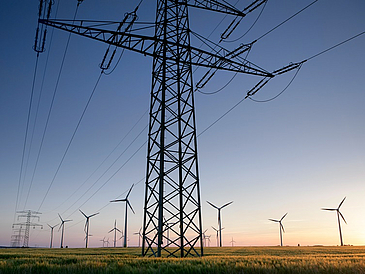Since 2010, newly built or extensively refurbished buildings have to be equipped with so-called “intelligent electricity meters”. Over the course of a normal day when prices vary according to peak and low consumption times, these innovative meters are capable of selecting the lowest priced periods. This leads to savings in money and is environmentally friendly. For example, a programmable washing machine will avoid peak consumption times and only switch itself on when electricity is at its cheapest.
However, researchers at the University of Bremen’s Institute for Theoretical Physics cast doubt on whether these gadgets actually perform what is expected of them and really do dampen grid fluctuations and the incidence of outages. They have created simulation models of the market that will emerge once intelligent electricity meters are deployed on a large scale. And they arrive at some surprising conclusions. According to their calculations, the intelligent electricity meters will create a new artificial market for electricity that – as happens on all markets – could easily give rise to bubbles and crashes. The Bremen physicists recently published their findings in the world’s oldest and most-read physics journal, the Physical Review of the American Physical Society.
Choosing the lowest priced time to do the laundry
Thanks to the turnaround in energy policy and technological progress, instead of having to pay a 24-hour flat rate price for electricity, home owners can now program electrical devices to use cheaper electricity – as in our washing machine example above. All they need is an intelligent electricity meter that monitors electricity prices and takes advantage of lower prices at non-peak hours.
It has always been a problem to feed power evenly into the electricity grid. Today, though, the advent of wind and solar energy means that fluctuations in the power supply are becoming even more pronounced. The idea behind making it mandatory to use intelligent electricity meters is to dampen such fluctuations. At times when energy is being generated and fed into the grid – for instance when the wind is blowing strongly – electricity becomes cheaper, and when less power is available it will be more expensive and hence less in demand.
Washing machine users will be quick to catch on. With the aid of intelligent electricity meters they will program household devices to be activated when a certain price level is reached.
So far, so good. “The basic assumption behind all this is derived from economics, which tells us that prices are regulated by supply and demand. This is now to be applied to the market for electricity: At times of high supply – lots of consumers; low supply, fewer users”, explains Professor Stefan Bornholdt from the Institute for Theoretical Physics. “Applying the standard theory of supply and demand, though, fails to take into account what happens when large numbers of consumers all compete for the lowest price at one and the same time. After all, we will all want our washing machines to switch on when electricity is at its cheapest”.
New market “chaotic, wild and jittery”
However, according to the Bremen professor and his colleagues Stefan Börries and Sebastian Krause this is not going to work. Their computer simulations of competitive consumer behavior reveal how this new segment of the market for electricity is likely to become “chaotic, unpredictable and jittery” – similar to the financial markets.
As Stefan Bornholdt explains, “At times when there is less power available in the grid and the price is subsequently high, washing the clothes will simply be put off. This can’t go on forever, though, because clean laundry is a basic need. The more programmed washing machines in stand-by mode waiting for cheaper electricity, the higher the pent-up demand. This results in the occurrence of a demand bubble”. And as soon as the price begins to fall this bubble will burst. Due to the pent-up need for clean clothes, large numbers of consumers who initially raised the level of their ‘pain threshold’ will suddenly switch on innumerable washing machines all at the same time. “This will trigger a collective avalanche mechanism, placing an extreme burden on the power grid which could easily lead to blackouts as a consequence of unexpected overloading”, says the Bremen Physicist.
Warn the suppliers before the onslaught
According to his team’s research findings, mass introduction of the new intelligent electricity meters constitutes “a quick-fix solution that has not been sufficiently thought through”. It is important to make electricity suppliers aware of the potential scenarios. “We integrated a number of variables in our computer model to illustrate how real people will logically react in such situations”, says Bornholdt. “Individuals naturally don’t think about the consequences of their behavior when everyone follows suit. Unfortunately, the suppliers may also still be blissfully unaware”.
Sebastian M. Krause, Stefan Börries, Stefan Bornholdt: “Econophysics of adaptive power markets: When a market does not dampen fluctuations but amplifies them”, Physical Review E 2015
If you would like more information on this article, please contact:
University of Bremen
Institute for Theoretical Physics
Prof. Dr. Stefan Bornholdt
Phone: +49 421/218-62060
e-mail: bornholdtprotect me ?!itp.uni-bremenprotect me ?!.de
www.itp.uni-bremen.de/complex

